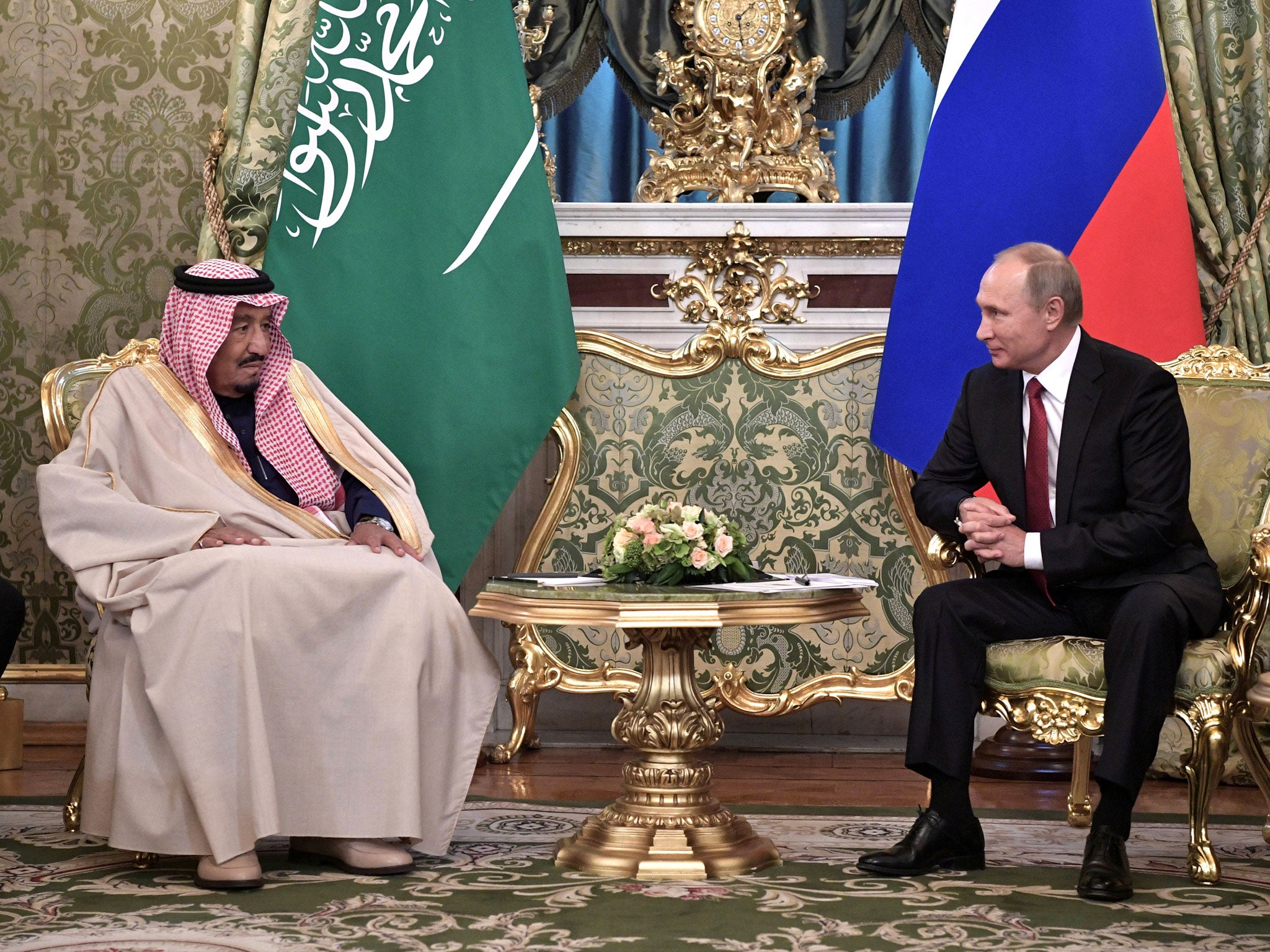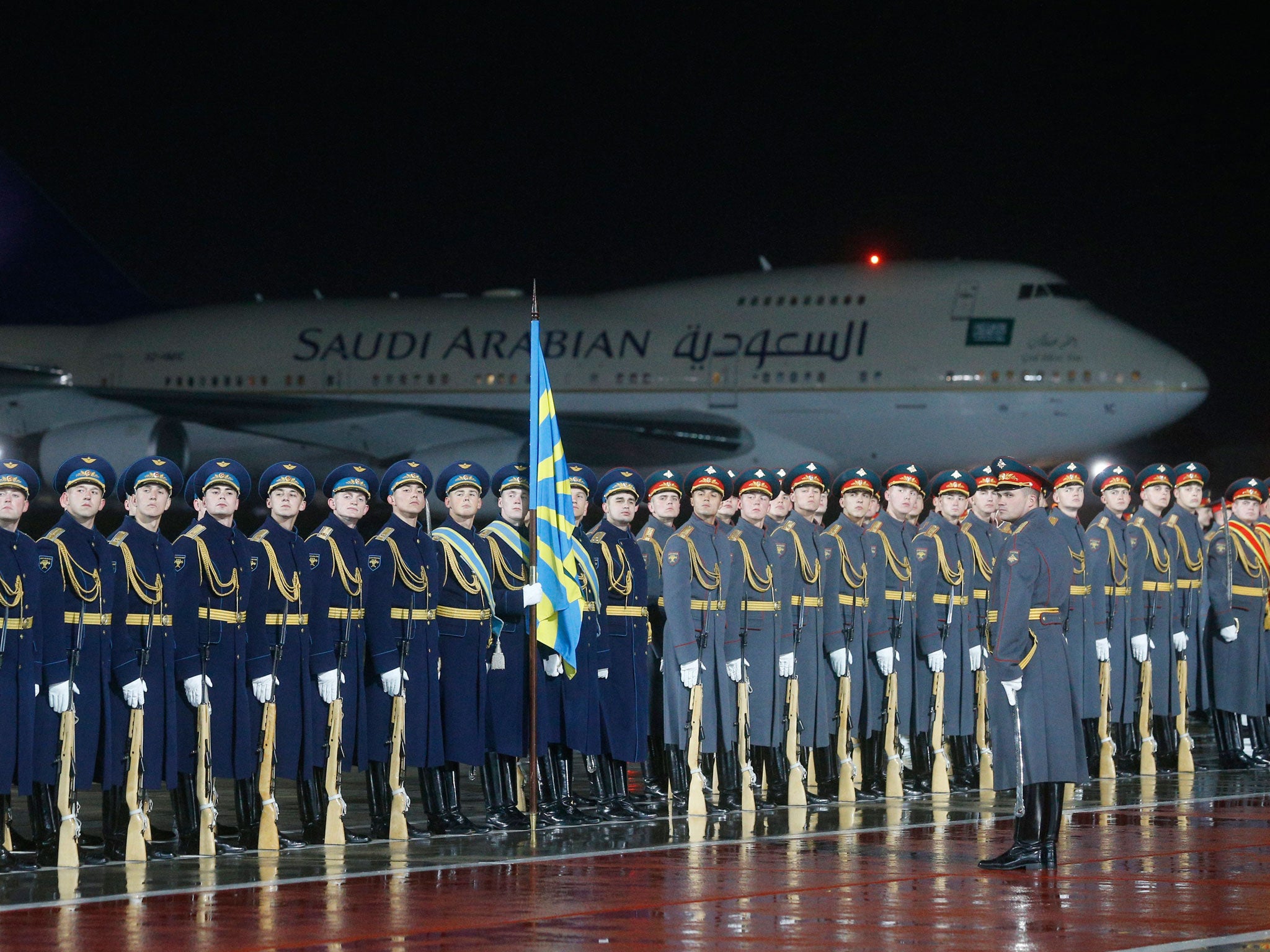Russia and Saudi Arabia 'sign $3bn arms deal' as King Salman visit shows how much relations have changed
Sergei Lavrov calls it ‘a real turning point’. For Saudi Arabia, King Salman says, Russia is ‘a friendly country’

A faulty golden aircraft escalator and anger from Moscow’s elite about a 200-strong Saudi retinue taking over all the city’s 5-star hotels failed to dampen the fanfare accompanying King Salman bin Abdulaziz Al Saud on his first state visit to Russia. Met with an honour guard of dignitaries and the Preobrazhensky military orchestra, the Saudi king was sped along on a highway specially lined with billboards advertising the visit and a week-long festival of Saudi culture.
This was a big deal for Russia – with multi-billion energy and defence contracts in the balance – and it wanted King Salman to know.
Ahead of the visit, Russian Foreign Minister Sergei Lavrov described the event as “an historical moment”. At the summit in the Kremlin on Thursday, Vladimir Putin agreed: This was a “landmark event” that would provide a “boost” to relations. And King Salman returned the compliments. Russia was “a friendly country,” he said.
According to the Kommersant newspaper, agreement has already been reached on a $3bn (£2.2bn) deal to supply the Saudis with Russia’s most advanced air defence missile system, the S400 Triumph. According to the publication, the deal will be signed off at a WTO meeting at the end of October. There may be other deals forthcoming on aircraft and helicopters – that depending on the success of talks.
Defence is one of few technological sectors where Russia can still claim to be a world leader, with over a fifth of all arms deals in 2016. But with China and India, Russia’s biggest markets, looking to move towards military self-sufficiency, Russia is with increasing urgency looking to open new markets.
The Saudi partnership comes at the end of several years of courtship – and off the back of a tetchy relationship.
Russia first announced that it had brokered a $20m (£15m) deal back in 2012. But that deal had several strings attached, namely a demand that the Kremlin could not sell the C-300 missile system to Iran, the Saudis’ major regional rivals. Then, President Putin looked the other way, signing off on a new arms contract with Tehran worth $1bn (£762m).
That move underlined the historical distrust between the two countries. The Saudis have been accused for supporting anti-Russian insurgency – whether in mujahedeens against Soviet troops in Afghanistan, or Wahhabist Islamic groups in Chechnya and Dagestan. The presence of Ramzan Kadyrov, Chechnya’s rascal president and keen promoter of rival Sufism ideology, at talks in the Kremlin served as a reminder of those differences.
Most recently, Russian operations in Syria have put it in direct conflict with Saudi interests. The Saudis remain opposed to Bashar al-Assad, whose regime is being supported by Russian military power. The gulf kingdom, on its part, is also believed to be funding rebel groups opposed to al-Assad.
But while the sides remain some way from a common position, the Independent has learned negotiators believe progress on de-escalation zones may be made.
“The Saudis have lost interest and realise that Russia now owns the crisis,” says Yuri Barmin, an expert at the Russian International Affairs Council. “They see how the balance of power is changing in the region: how the US is pulling out and how Russia is now increasing its influence in the Middle East.”

Russia’s geopolitical march in the region has made a highly improbable state visit possible. But the timing of the talks has little to do with Syria. Instead, King Salman is believed to be in Moscow to shore up international support for his son, Crown Prince Mohammed bin Salman, next in line to the throne.
“King Salman wants Russia’s backing for his son,” says Mr Barmin. “Bin Salman is poorly perceived at home over his role in the unpopular Yemen war and the blockade of Qatar.”
For Russia the stakes are even higher. Hamstrung by Western sanctions and uncompetitive industry, it hopes the new bonhomie will provide impetus to its struggling economy.
On Wednesday, President Putin hinted that there would likely be further cooperation to lift the oil price, the lifeblood of the Russian economy. Ministers also made it clear that they hope the Saudi delegation will deliver on investment from the kingdom’s sovereign wealth funds.
So far, the record on Saudi investment is poor. Of $10bn (£7bn) promised to Russia in 2015, only $1billion has actually ever materialised.
Join our commenting forum
Join thought-provoking conversations, follow other Independent readers and see their replies
Comments